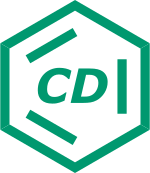ChemDraw is a molecule editor first developed in 1985 by Selena "Sally" Evans, her husband David A. Evans, and Stewart Rubenstein[1][2] (later by the cheminformatics company CambridgeSoft). The company was sold to PerkinElmer in 2011.[3] ChemDraw, along with Chem3D and ChemFinder, is part of the ChemOffice suite of programs and is available for Macintosh and Microsoft Windows.
 | |
| Developer(s) | Revvity |
|---|---|
| Stable release | 23.1.1
/ April 24, 2024 |
| Operating system | macOS, Microsoft Windows |
| Type | Scientific |
| License | Proprietary |
| Website | ChemDraw on Revvity Signals website |
Features of ChemDraw 12.0
edit- Chemical structure to name conversion
- Chemical name to structure conversion
- NMR spectrum simulation (1H and 13C)
- Mass spectrum simulation
- Structure cleanup
- Draw ligand Structure
- An extensive collection of templates, including style templates for most major chemical journals.
- Export to SVG
- Export to PDF (Mac Version only)
File format
editThe native file formats for ChemDraw are the binary CDX and the preferred XML-based CDXML formats. ChemDraw can also import from, and export to, MOL, SDF, and SKC chemical file formats.
Plugins
editSDK for ChemDraw enables third-party developers to write plugins. For example, Quick HotKey helps to set up HotKeys in interactive mode instead of manually editing the text file.
The plugin website http://www.cambridgesoft.com/services/documentation/sdk/ appears to have been abandoned, and redirects to Revvity Signals' website.
References
edit- ^ Halford, Bethany (2014). "Reflections On ChemDraw". C&EN. 92 (33): 26–27. doi:10.1021/cen-09233-scitech1. Retrieved 20 August 2014.
- ^ Evans, David A. (2014-10-13). "History of the Harvard ChemDraw Project". Angewandte Chemie International Edition. 53 (42): 11140–11145. doi:10.1002/anie.201405820.
- ^ "Announcing CambridgeSoft from Perkin Elmer". Archived from the original on 2014-09-11. Retrieved 2014-09-09.
- Mills, N. (2006). "ChemDraw Ultra 10.0". J. Am. Chem. Soc. 128 (41): 13649–13650. doi:10.1021/ja0697875.
- Li, Z.; Wan, H.; Shi, Y.; Ouyang, P. (2004). "Personal Experience with Four Kinds of Chemical Structure Drawing Software: Review on ChemDraw, ChemWindow, ISIS/Draw, and ChemSketch". J. Chem. Inf. Comput. Sci. 44 (5): 1886–1890. doi:10.1021/ci049794h. PMID 15446849.
- Strack, Dieter (2001). "ChemOffice Ultra 2000". Phytochemistry. 57 (1): 144. doi:10.1016/S0031-9422(00)00503-3.
- Madlung, Andreas (1999). "Digital Chemical Intelligence". Science. 285 (5435): 1866–1867. doi:10.1126/science.285.5435.1866. S2CID 60908986.
- David A. Evans (2014). "History of the Harvard ChemDraw Project". Angewandte Chemie International Edition. 53 (42): 11140–11145. doi:10.1002/anie.201405820. PMID 25131311.